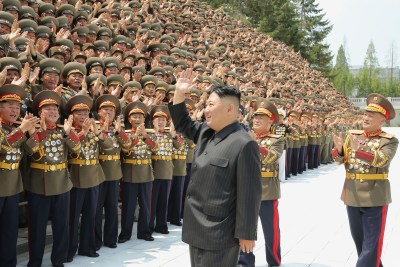Moscow and Pyongyang are taking active steps to strengthen their alliance. The situation may look like a win-win for both sides but North Korea has more to gain from cooperation than Russia.
Russia has long been one of North Korea’s closest allies, with their relationship dating back to 1945 when Korea was divided into North and South. The close ties between the two nations were confirmed earlier this year through North Korea’s support for Russia’s invasion of Ukraine.
Russia soon reciprocated the gesture by vetoing additional sanctions proposed by the United States against the Democratic People’s Republic of Korea at the UN in May 2022. That marked a significant move by Moscow since Russia had never before vetoed UN sanctions against North Korea and had even implemented them in the past.
Russia’s support for North Korea in 2022 is far more public and noteworthy than over the past few decades.
After North Korea recognized the “independence” of the Russian-backed Ukrainian breakaway republics in July 2022, proposals to bring North Korean labor to the Donbas region began making headlines.
That would provide the North Korean government with much-needed foreign currency, which has been difficult to acquire throughout the Covid-19 pandemic.

Although Russia supported sanctions in 2017 requiring UN member states to expel all North Korean workers from their territories, Moscow’s tone seems to have changed. But North Korean labor would only benefit the Kremlin if Russia ends up winning the war in Ukraine.
Another surprise came in August 2022, when the New York Post reported that North Korea was offering Russia 100,000 “volunteer troops” for the Ukraine offensive. Although the claim was difficult to verify, it raised concerns over how closely Russia and North Korea were cooperating behind the scenes.
But North Korea is unlikely to send troops to fight in Ukraine, as this would come at a major political cost that is likely not worth the risk for Pyongyang.
In early September, the United States accused Russia of trying to buy “millions of rockets and artillery shells” from North Korea to use in the war in Ukraine. Russia has already violated international sanctions by reportedly purchasing weapons from Iran.
But military experts are skeptical about the quality of North Korean weapons and how much they would really help the Russians in Ukraine.
North Korea tried to put the rumor to rest in late September when an unnamed Ministry of Defense official said the country was not selling weapons to Russia. “We have never exported weapons or ammunition to Russia before and we [do] not plan to export them,” the official was quoted as saying.
The official accused the United States and other “hostile forces” of spreading rumors to pursue its base political and military aims.
Given that plans between Moscow and Pyongyang remain in the realm of imagination, there is no significant cause for concern for the time being. As it currently stands, North Korea has more to gain from cooperation than Russia.
While Russia may still lose the war or remain bogged down in Ukraine for an unforeseeable period of time, North Korea stands to gain foreign currency from potential cooperation with Russia and, more importantly, gain Russian support at the UN.
With Russian and Chinese support at the UN, North Korea is likely to feel emboldened to take greater risks than ever before.

Since further sanctions cannot be implemented without the agreement of these two permanent members of the UN Security Council, having Moscow and Beijing in its corner means a great deal to Pyongyang. Beijing has implied that it would not support additional sanctions even if North Korea conducted a seventh nuclear test.
While North Korea has long been accustomed to international isolation, things are different for Russia. Russia is now largely isolated internationally and in need of support.
If it continues to remain stuck in a prolonged war with Ukraine, the implications for Russia’s international diplomatic position and its domestic economy will not be positive. That is likely one of the reasons why Moscow reached out to Pyongyang after the outbreak of the war.
But North Korea is calculating and strategic. Pyongyang will not take unnecessary risks if the rewards are insufficient. North Korean officials may continue providing verbal support to Russia, but this doesn’t mean they are prepared to have their own people die in a war that means little to them.
Although North Korea would engage with the proposal to send labor to the Donbas region, this would be possible on a large scale only if Russia manages to win the war. Until then, North Korea remains emboldened while Russia’s options look increasingly limited.
Gabriela Bernal is a PhD candidate at the University of North Korean Studies, Seoul.
This article, republished with permission, was first published by East Asia Forum, which is based out of the Crawford School of Public Policy within the College of Asia and the Pacific at the Australian National University.

